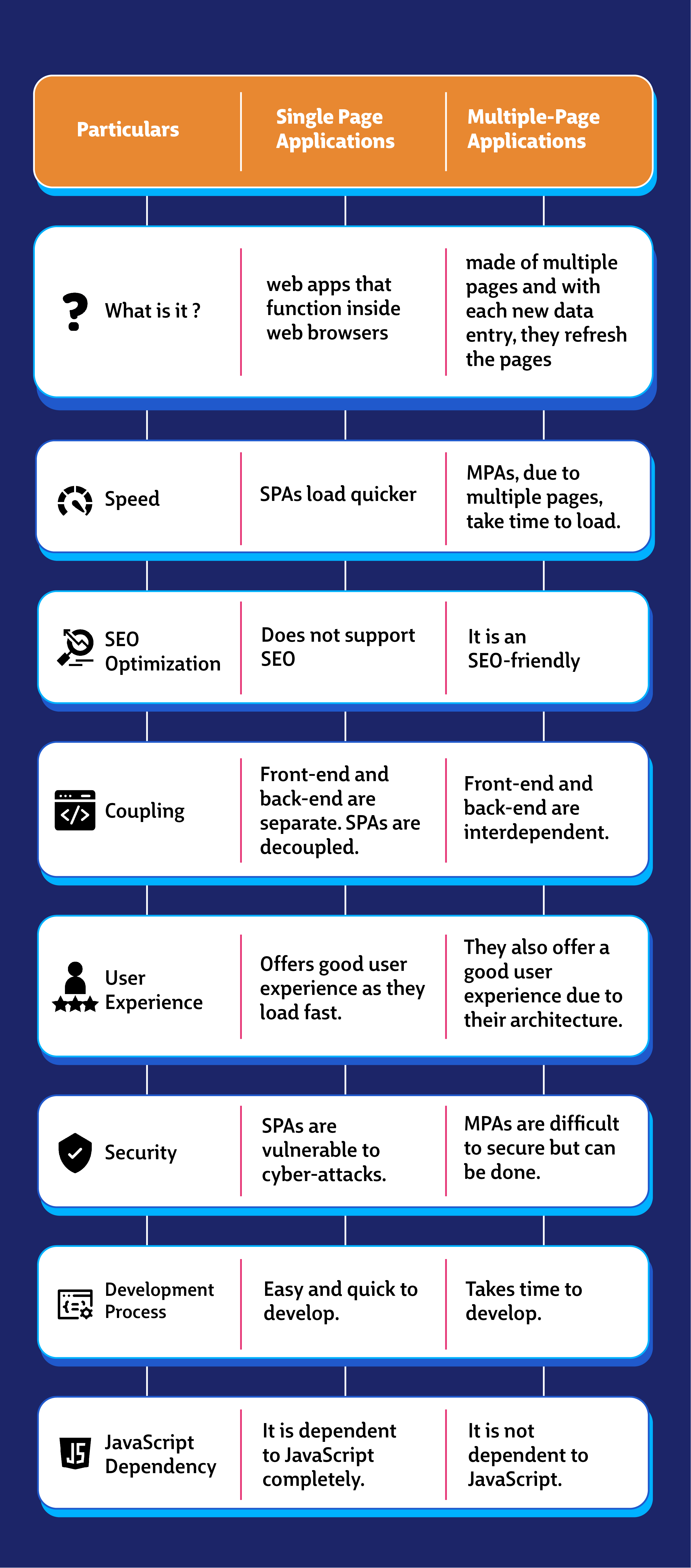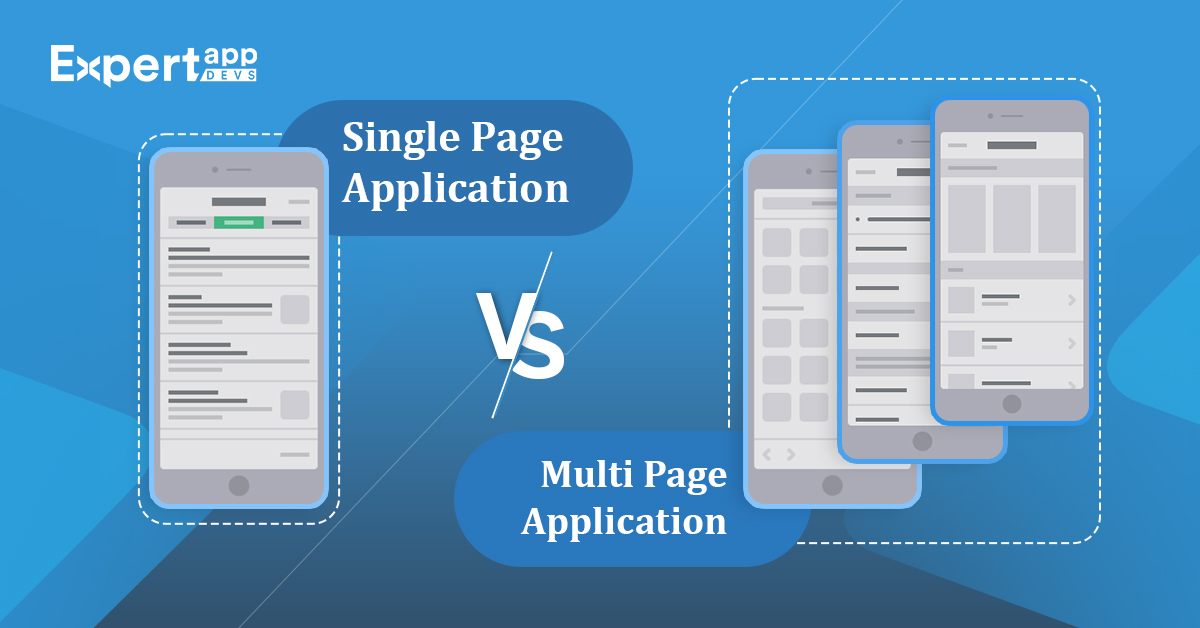Single Page Application vs. Multi Page Application - A Brief Comparison
Gone are the days when businesses and even developers preferred to develop desktop websites. However, websites have been replaced today with highly robust, easy-to-use, and easy-to-update web applications.
The best thing about a web application is that it is platform-independent. Even though millennials prefer mobile-based apps, the demand for highly dynamic and versatile web apps is growing rapidly.
If you want to develop a business web application, you have to choose between two: a single-page web application and a multiple-page application.
In this post, we will discuss almost everything about these two types of web applications including multiple-page and single page application architecture, their pros and cons, and other crucial details.
However, before we start discussing SPAs and MPAs, let’s check out what web apps are:
What is a Web Application?

Web applications are basically computer programs that reside on remote servers and can be accessed through web browsers.
Web applications use various web technologies to perform various tasks. Developers use a client-server architecture to build secure, robust, and feature-rich web applications.
There is an apparent difference between a normal website and a web application. For example, a website is a wide collection of highly relevant web pages.
On the other hand, a web application is developed using a combination of various server-side and client-side scripts to show information to visitors.
Also, a web application manages user requests with the help of a server. Furthermore, developers must precompile a web application before they deploy it on a server.
A website does not need such precompilation. Also, a website does not need any type of authentication to visit it. A web application needs authentication, most of the time.
Also, users don’t need to download a web app. Instead, they can be accessed through a web browser such as Windows, Linux, and MacOS.
Some examples of web applications are Flipkart, Twitter, and Pinterest.
Single-Page Application

All single page applications are actually web apps that function inside web browsers. Furthermore, these SPAs don’t need any page reloading while running.
We all know such single page applications every day. Examples of single page applications are Google, Gmail, Google Maps, GitHub, and Facebook.
SPAs are excellent at imitating a browser’s natural environment and offer a speedy performance. Also, it does not need any page reloads and loads fast.
A single page application is just one page that you visit. It depends on JavaScript to load other content on the page.
When a user visits the SPA, it renders pages in the browser directly with the help of various frameworks such as AngularJS, Ember.JS, and MeteorJS.
SPAs offer a fulfilling user experience to visitors by keeping them on one page and loading content in the best presentable way.
The best way to architecture a single page application is to hire an experienced developer with a proven track record.
What are the advantages of SPAs?
Here is a list of benefits that SPAs have to offer:
- First of all, SPAs are highly fast as the browser has to load all the resources once such as HTML+CSS+Scripts. All it does is transmit the data back and forth. Also, the development of single page applications is highly simple and streamlined. Developers don’t have to write codes for page rendering on the server. It is easy to use and easy to update as well.
- Furthermore, you can easily debug the single page app with Chrome. With it, you can perform various tasks such as monitoring network operations, and investigating page elements and data.
- If you want to develop a mobile app from a single page app, it is much easier. All you need to do is to reuse the backend code for a web app and a native mobile app.
- In addition to that, single page applications also can cache local storage efficiently. All it needs to do is to send a request once and store all the data. This data can be used offline as well.
- As it is a single page app, it loads content way faster than multiple-page applications. Visitors love apps that load faster and in this case, you can earn their loyalty and engagement.
- Single page applications can be developed in just no time. An experienced developer is what you need to develop a feature-rich SPA.
- Also, as SPA development involves popular frameworks such as React, VueJS, and AngularJS, they come with their own debugging tools, making it easy and effortless.
What are the cons of SPAs?
Now let’s check out some of the disadvantages of SPAs.
- If you want to make your single page application SEO-friendly, it is a challenging task. The main reason is the content of a SPA is loaded by AJAX. AJAX (Asynchronous JavaScript and XML) is a method of data update and exchange without the need to refresh the page.
- The browser must be JavaScript-enabled. If a user has disabled JavaScript in the browser. The application will not load properly and its content will not be displayed properly.
- The security issue is also a worrisome concern with PSAs. Hackers mostly attack single page applications with cross-site scripting by injecting malicious scripts into the app. Businesses might end up losing sensitive data.
Multi-Page Application

One of the most crucial differences between SPAs and MPAs is server involvement. In a single page application, pages are built by developers in the browser with JavaScript.
On the other hand, in a multiple-page application, pages are developed by the server and then sent to the browser. MPAs are made of multiple pages and with each new data entry, they refresh the pages.
Here, you need to keep in mind that if the server stops exchanging data with the browser, the page reloading with new data might not support it.
E-commerce stores are the most viable examples of multiple-page applications. Whether you want to develop an online shop or a marketplace or an online catalog app, you can go for MPAs.
Developers prefer MPAs when they want the page’s functionality to change while page switching.
eBay and Amazon are classic examples of MPAs.
What are the advantages of MPAs?
- Though you might wonder why MPAs are in demand as SPAs are way better than MPAs in many parameters, MPAs are still relevant for many specific business solutions where SPAs might disappoint you.
- While optimizing a SPA for SEO is quite challenging, it is not the case with an MPA. MPAs can be SEO-optimized easily as all pages have their separate URLs and developers can add meta tags to them for optimization. Also, they can update content frequently to lure search engines. If you want your web application to rank higher on SERPs, you should go for an MPA.
- If you are planning to expand your business in the future with more products or services, you should go for MPAs. There is no limit when it comes to adding pages in an MPA. However, you must remember that with more pages, the performance of the web app might decrease.
- Data insights can help you in making more customer-centric decisions. Also, with real-time data, you can easily offer personalized services to your customers. When it comes to data analytics, you can blindly choose MPA development. You can get data insights such as the number of visitors, session duration, target audience, bounce rate, etc. in MPAs, your app’s backend deals with the pages, which is an ideal situation for data analytics tools to offer the best outcomes. However, you might invest more money and effort for such data insights.
What are the main disadvantages of MPA?
Let’s check out some disadvantages of MPAs as well. Here is a list:
- The performance is not up to the mark. The main reason is that when someone refreshes the page, the browser will have to display all the data again.
- Also, you will need additional servers to maintain an MPA. it might cost you a lot.
SPA VS MPA - Comparison
Now, in this final section, we will compare SPAs and MPAs for various parameters.

1. Speed
Speed is one of the crucial deciding factors for users. Many studies reveal that if a website or an app takes more than 3 seconds to load, users will simply move to the next search.
It is a true fact that the attention span of millennials is getting shorter. When it comes to speed, SPAs load quicker compared to MPAs as they load the most of app resources once and for all.
Also, when a user sends a new page request, it does not have to reload the whole page.
On the other hand, MPAs have to reload the whole page from scratch when it receives a new page request. The loading time increases when you have too many images on the page. So, when it comes to speed, SPAs win the race.
2. Coupling
The front end and back end of a SPA are separate and different. Hence, SPAs are decoupled. On the other hand, MPAs have interdependent front-end and back-end.
3. SEO Optimization
Here, MPAs clearly beats SPAs. As we have discussed earlier, SPAs are not SEO-friendly. On the other hand, MPAs have separate URLs for each page, making it easy for developers to write meta tags.
In addition to that, single-page applications are heavily run on JavaScript, which is a language that is not supported by most search engines. Pages of an MPA can be optimized separately for different keywords.
4. User Experience
User experience is one of the main factors that will determine the success of your app. Believe me, if users don’t find the experience on your web application fascinating, they will never come back to the app again.
Furthermore, nowadays, millennials use mobile phones to access the web and mobile apps. Hence, your web app must be mobile-responsive. Single page applications are more mobile-friendly compared to MPAs.
However, multiple-page applications also offer a good user experience to visitors. MPAs have a better information architecture with a clear navigation path.
Users can find information easily and effortlessly. Also, there is no limit when it comes to adding content to pages. You can facilitate more information to your users compared to SPAs.
5. Security
When it comes to security, MPAs might trouble you. Single-page applications have a single page that is easy to secure by integrating all the security measures.
On the other hand, in a multiple-page application, you have to secure each page separately. On the other hand, single page applications are more prone to security attacks from cybercriminals as they run on JavaScript.
JavaScript doesn’t allow code compilation, which, in turn, makes the app more vulnerable to attacks.
6. Development Process
A short app-to-market time is another important factor to consider for web app development. Deploying your app in the market early might help you to get a competitive edge.
When it comes to development process and speed, single-page applications win the race as their reusable backend code quickens the development speed.
Furthermore, you can use the same code to develop native apps as well. Hence, for developers, developing a single-page application is like smooth sailing.
On the other hand, when it comes to multiple-page application development, it takes more time compared to SPAs.
7. JavaScript Dependency
Single-page applications are highly dependent on JavaScript and it might be a problem if you want to SEO your web app. Most search engines such as Google don’t support JavaScript and even if they support it, the results are not satisfactory.
In addition to that, if a browser has been disabled for JavaScript, the app might not load properly, disturbing the user experience. It might result in higher bounce rates. Also, JavaScript dependency makes SPAs more prone to security attacks.
On the other hand, multiple-page applications are not dependent to JavaScript and are more SEO-friendly, secure, and versatile.
Conclusion
We have compared single page and multiple-page web applications thoroughly including multiple-page and single page application architecture, their benefits and cons, and a brief comparison for various points.
Both- single-page and multiple-page web applications have their own benefits. You need to evaluate your business requirements and future scalability to choose the best web application format that can serve your business goals effectively.
Both architectures have their own flaws. When it comes to speed and code reusability, single-page applications win the race. On the other hand, security and SEO-friendliness are strong areas of multiple-page applications.
Choose one of the these two web applications based on your business requirements and scalability goals.
 Jignen Pandya
Jignen Pandya




